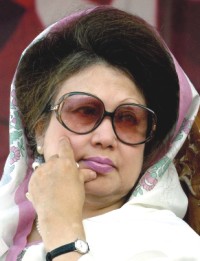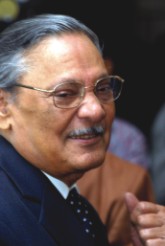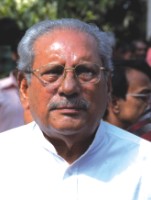Special Feature
 |
| BNP chairperson Begum Khaleda Zia. |
BNP in the Wilderness
Syed Zain Al-mahmood
The Bangladesh Nationalist Party's defeat in the ninth parliamentary election surprised no one. With the soaring price of essentials weighing on the minds of the electorate, most of the top leadership hauled off to jail on corruption charges, and the anti-incumbent factor in play, an electoral loss was always on the cards. But it was the scale of the loss that caught many analysts off guard. For the party that swept to power with 193 seats and 40.97% of the popular vote in 2001, a measly 30 seats and 33% of the vote was a bitter pill to swallow.
The crushing defeat has bred dissent within the BNP. The debacle demoralised the rank and file and the situation was worsened by finger-pointing among the top brass. There has also been a tendency to settle scores for alleged disloyalty during the caretaker government rule. All of this has thrown the BNP into an organisational tailspin.
For now, the BNP is reconciled to the fact that the Awami League will be in power for the next five years, and they will be occupying the opposition benches. To its credit, the party has not shown any real tendency for confrontational politics. The BNP MPs duly took oath and initially joined the parliament session. But many analysts think that the electoral fiasco may have hampered the BNP's ability to function as an effective opposition.
“The election defeat has had a dampening effect on the BNP workers and leaders,” says Prof Emajuddin Ahmed, former vice-chancellor of Dhaka University. “The challenge for the BNP leadership is to reform and regroup the party. This is important not only for the BNP but for the nation as a whole. A robust opposition is an important ingredient of any democracy.”
 |
| Prof Emajuddin Ahmed |
But ironically “reform” has become a dirty word in political circles recently, with many politicians within the BNP and the Awami League equating it with the alleged attempt by the caretaker government to replace the supreme leaders of both the major political parties. Observers say “reformist” leaders have been increasingly marginalized within the BNP. Several senior leaders have distanced themselves from party activities, and there seems to be a dearth of faces with a broad public appeal. All of this is making it increasingly difficult for the BNP to get its message across to the population.
Heavy election defeats often breed a siege mentality. Following the loss in the December 2008 elections, the BNP chairperson Begum Khaleda Zia appears to be looking to her core group of loyalists. But political observers warn that this often turns into a vicious cycle. As a party leader searches for loyalty, efficiency is sometimes overlooked. This in turn leads to a further erosion of public appeal and more losses at the ballot box.
BNP leaders deny that the party is in disarray and is unable to function as a viable opposition. They are keen to point out that their attempts to play the role of a responsible opposition have been thwarted by the government. “The government does not want an effective opposition,” claims BNP standing committee member MK Anwar. “From the beginning the ruling Awami League has been trying to undermine our role. The Bangladesh Television broadcast the oath-taking ceremony of all the MPs, even the independents. But when it came to our turn, they did not broadcast it. The same happened with the discussions on the Pilkhana tragedy. When our leader stood up to speak on the matter, it was blacked out on national TV. They are withdrawing the cases filed against their own leaders, but at the same time filing politically motivated cases against BNP men. All of this is part of a government plan to destroy the opposition.”
Prof Emajuddin Ahmed also believes that the government can and should do more to accommodate the opposition. “The Awami League came to power promising change, so we should see an end to politics of vengeance,” he says. “There were many occasions when the prime minister could have taken the opposition into confidence. The BDR incident and the Tipaimukh dam issue are examples of this. The BNP may have got 30 seats, but it won 33% of the vote. In democracies, the government usually adopts a bipartisan approach to matters of national importance.”
Prof Ahmed however thinks that in spite of the less than conducive atmosphere, the BNP should play its role in parliament. “The Awami League may have been selfish and arrogant, but the BNP also has been obstinate on some issues, such as the seating arrangement in parliament. The main opposition's presence during the budget session would have been very important.”
 |
MK Anwar |
MK Anwar agrees that the absence of the BNP in the budget session was unfortunate but he says the Awami League is to blame. He points out that the ruling party did not keep its word on giving the opposition the post of Deputy Speaker of the House. Both Awami League and BNP had announced in their manifestos that they would leave the post of Deputy Speaker for the opposition if elected in the December 29 general election. However, after the Awami League won, Col (retd) Showkat Ali of AL was elected Deputy Speaker by voice vote.
“They are acting as if they want a country where there is no opposition,” says MK Anwar, who is also BNP Vice President. “Is this the “change” they have in mind?”
The BNP is under pressure to get its house in order following the ruling party's national council meeting. The BNP has asked the Election Commission for more time to hold its own council. BNP leaders however deny that this is because of infighting and a lack of organization at grass roots level.
“We will hold our council by December,” says BNP leader Major (retd) Hafiz Uddin Ahmed. “We want to get the opinion of the grassroots leaders, and make this properly democratic.”
Hafiz Uddin is unimpressed by the AL council. “The Awami League held their council hastily,” he says. “Hasina was re-elected president and Syed Ashraful Islam was elected general secretary unopposed by a show of hands. A secret ballot would be more democratic. The councilors then gave the president absolute powers to select the rest of the leadership. How is this council any different from the previous 19? The country wants to see real change. I would not call that a sign of Change. Hopefully, our council will be better.”
 Major (retd) Hafiz Uddin, known as a pro-reform leader, maintains that the BNP has not put reform proposals on ice. “Many of the proposals suggested by myself and others have been implemented in the draft party constitution submitted to the Election Commission,” he says. “Reform is a gradual process. It has to come from within the party, and it has to reflect the hopes of the nation.” Major (retd) Hafiz Uddin, known as a pro-reform leader, maintains that the BNP has not put reform proposals on ice. “Many of the proposals suggested by myself and others have been implemented in the draft party constitution submitted to the Election Commission,” he says. “Reform is a gradual process. It has to come from within the party, and it has to reflect the hopes of the nation.”
The Awami League has been actively trying to incorporate younger and more dynamic faces into its leadership, and analysts say this is reflected by the election of Syed Ashraful Islam as general secretary. There are also several comparatively youthful members in the cabinet. By contrast, BNP's secretary general is elderly and prone to illness. But despite this, Major (retd) Hafiz Uddin does not think there is a lack of dynamism within the BNP.
“We have not completed our council yet, so let us wait and see. We are in the process of rejuvenating the party. Besides, we need a combination of experience and youth. Look at some of the mistakes the younger ministers in the present administration have made. You need seasoned people at the helm.”
If the BNP is to be rejuvenated, say political analysts, internal rifts must be healed and the party must get out its core message to the people. “To get the BNP back on track, Begum Khaleda Zia must decide on her core team,” says Mahi B Chowdhury spokesperson of Bikalpa Dhara Bangladesh, and former BNP MP. “We have to remember that the spokespeople carry the image of the party. Right now, there seems to be an image crisis.”
Mahi B Chowdhury, son of BNP founding Secretary and former President Prof AQM Badruddoza Chowdhury believes the BNP is now at a crossroads. “The election loss was a bad blow. Now the BNP has to do a lot of soul searching. The party has been in crisis before -- during the rule of Ershad, when a lot of leaders left and Awami League developed an understanding with the General Ershad. At that time there were a few men of principle like my father Prof. Chowdhury who helped Begum Zia steer the party out of trouble. Who will she turn to this time? If she chooses able people, then yes -- I think the BNP can come back. Begum Zia needs men of principle, leaders who are acceptable to the people.”
 |
| Major (retd) Hafiz Uddin |
Although some pundits predicted the imminent demise of the BNP after the election debacle, BNP leaders are adamant they can come back. Politics can change quickly and the pendulum has a tendency to swing. They are hoping that the Awami League will overreach, and the BNP can take advantage.
Supporters of the Bangladesh Nationalist Party have seen their party stumble from its polls defeat to a summer of discontent where tussles between the different segments of the BNP have made headlines. “It's a sad situation,” says Shamsher, a shopkeeper in Lalbagh who voted for the BNP in the last election. “My family and I always vote for sheaf of paddy. I hope Begum Zia will do everything to reform the party. Bangladesh needs the BNP to be strong.”
“Our positions on all the major issues of the present day are pro-people,” says Major (retd) Hafiz Uddin Ahmed. “From Tipaimukh to giving transit to India, this government is following a subservient policy. We will do everything we can to highlight its failures and safeguard the interests of Bangladesh. After our council in December, you will see a new BNP.”
The BNP may be suffering a spell in the political wilderness, but its leaders believe they know the way back. BNP supporters will be hoping that their summer of discontent will give way to a winter of revival.
Copyright
(R) thedailystar.net 2009 |
